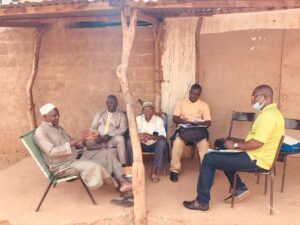
Welcome Home (Week 1)
Sabalibourou | Meeting with the Chief
This week, it was an honor meeting the chief of Sabalibouro, a peri-urban community in Bamako, Mali. My team introduced the Sustainable Community Project (SCP) to the chief and his councilmen. We expressed our interest in working with their community to implement SCP. Our meeting with the chief went very well to the point where the chief expressed immediate prioritization to be given to us to start the implementation of SCP.

During the meeting, I intended to observe, actively listen, and take notes. However, I spoke up after hearing about the chief and the councilman’s plan to initiate a project that aims at converting waste products, such as compost, to biomass (or some type of charcoal-like substance) used for preparing hot meals. After hearing his idea, I thought to myself what a bad idea this was. So I brought up my concern to the chief in a respectful manner. I said to him that I understood the logic behind their idea, which is to reduce waste by recycling them into a biomass that can be used for preparing hot meals, however, the burning of charcoal and/or biomass has many negative effects on the human body. I continued by saying that waste products produced by food (compost) can be used for enhancing the soil in which we grow our fruits and vegetables, which in turn boosts the economy by producing resalable produce. I further added that gas is preferable to biomass when it relates to human health. The chief agreed with my concern, however, his response was that before they (the community) use gas they must first use biomass (charcoal) because many of the members are not educated on the use of gas compared to biomass. Thus, their biggest concern with biomass vs. gas was benefit vs. harm. They considered gas to be more dangerous compared to biomass due to improper knowledge of the use of gas. Therefore, to avoid deadly fire accidents they preferred charcoal or biomass as their main source of cooking fire. The chief also expressed that they need to take it step by step and use what makes the most sense to them while they figure out the logistics of using gas for cooking. Additionally, he noted that recycled material to create biomass will help reduce waste products in their community while stopping deforestation. Hearing the chief’s responses to my concern was very humbling and honorable. I was glad to have had this fruitful conversation with the chief, he is an honorable man who has great ambitions and goals for his community.
Language | & Barriers
To best approach the implementation of SCP, my team and I met to discuss GAYO’s waste management analysis document, which gives detailed information on the steps taken by GAYO for the waste analysis report production. This meeting was interesting. First, I gained a lot of perspective on how Mali Health plans to adapt the SCP to fit its capacity. Second, I felt like during our first meeting, my supervisor spoke to me like a child with very minimal ability to read and understand. It felt weird and discomforting to me at first to be spoken to in that manner because generally I’m spoken in a manner of professionalism. In American culture when an adult is spoken to like a child it comes off as impolite. However, as an observer/visitor, I decided not to take any offense to it because I understood that my supervisor was trying to help me improve my Bambra by speaking to me in that fashion. Therefore, he went into great detail when explaining the document to me during our first meeting. The extent to which he explained the document was timely, therefore, we ran out of time and had to schedule a second meeting to finish the GAYO document discussion. In the second meeting on my second day at Mali Health, I noticed my supervisor’s manner of speaking with me had changed. He spoke to me with more dignity, trusting that I understood the document. Therefore, we were able to cut straight to the point and I was able to ask questions related to how we would adapt the document to meet the needs of our communities while being able to ask him to elaborate on areas of the document that were not clear to me. The second meeting was much more efficient and beneficial for everyone. But, Alhamdulillah, this was a wonderful lived experience that I will share with my other communities.
Merging (Week 2)
Last week I had an in-depth fruitful conversation with my aunt and cousin about pre/post-colonial Mali. So, basically, our conversation was about Mali in the 1880s & 1960s. We spoke about how Mali was succeeding with the ruling of President Modibo Keïta. My aunty expressed that around the time of Modibo Keïta, Mali was functioning sustainably and the streets of Bamako were so clean. She emphasized how the community was centered around the culture, and how traditional ways were respected and followed as laws. For instance, people were frowned upon if they littered or did not contribute to community efforts to keep the country up to par. Mali was united regardless of tribalism or religious beliefs. After our conversation, she told me to take a look at Mali’s original constitution. Therefore, this week I focused on finding Mali’s first constitution right after gaining its independence from the French government. However, during this research, I learned that Modibo Keïta had ruled as Mali’s head leader during colonialism and post-colonialism from 1915 to 1977. But now my main question is who ruled Mali before colonialism in the 1880s? and what was the constitution or constitution-like understanding of the people of that time? I hope that my Bambra Teacher who studies the history and social structures of Mali will be able to fill the gaps in the questions I have about Mali and its history. I honestly believe history is important to understand the future. My motto used to be don’t get stuck in the past but focus your energy on the future. That motto has always come in handy for me and has allowed me to advance in many ways in my life. However, as of today I now understand that it is important to look back at the past and analyze for gems that have worked for people or communities and utilize those hidden gems in the future. I hope by revisiting the past I can bring to light the gems of the past to the future, and hopefully what I find can be helpful to my Malian communities.
Resilience

As I complete week two at Mali Health, I’m grateful that the front doors of the Mali Health office are back open, and that I get to spend quality time with my colleagues. Our office was shut down and held responsible to pay for the reopening of our doors. What was most upsetting about the situation was the amount of money being requesting from the organization knowing that most of the organization’s money was allocated towards serving underserved peri-urban communities. But from this experience, I observed the resilience of my Malian colleagues as they fought to have the doors of Mali Health opened back up while sustaining their previous work without any delays. I applaud my team; they did a great job handling the situation. But what I loved most about their attitudes was the level of humility and humbleness they continued to bring to work. Every day I saw beautiful cheerful smiles on their faces, while they continued to amuse and encourage each other to keep the same tempo or better than before. What an honor to be surrounded by such a team. I am learning a lot about what good character means from this beautiful group of people. I’m learning how to speak with kindness, how to greet with grace, and how to have humility and humbleness before my elders and peers. Yah Allah, I am very grateful to you for this beauty! Alhamdulilaahi Robbil Alaameen.
